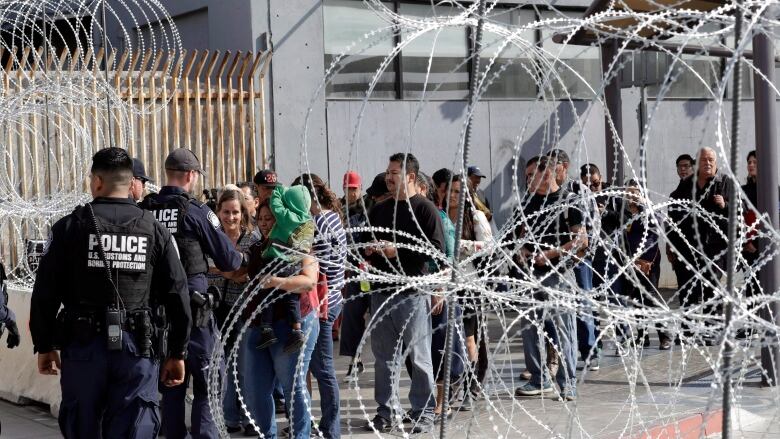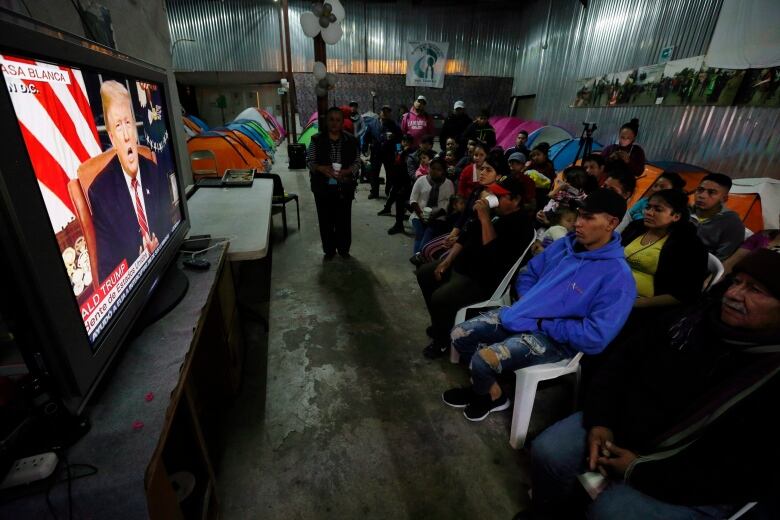Mexico begins to take in some U.S. asylum seekers while they await claims
Mexico appears to grudgingly agree with new approach, says numbers must be limited

The Mexican government says the United States plans to return 20 migrants per day to Mexico as they await an answer to their U.S. asylum claims.
The spokesperson for Mexico's Foreign Relations Department says Mexico doesn't agree with the move, but will accept the migrants.
Roberto Velasco said Friday the first 20 migrants to be returned at the San Ysidro crossing at San Diego and Tijuana are all Central Americans and all had temporary visas in Mexico.
He said the U.S. government wants to "gradually" extend the practice to the rest of the border crossing points.
Velasco said Mexico won't accept migrants who have appealed a denial of asylum, unaccompanied children or people who have health problems.
Mexico's ministry has said the actions taken by the Mexican and U.S. governments do not constitute a "safe third country" scheme, where migrants would have to request U.S. asylum while in Mexico. Such an agreement exists between the U.S. and Canada, but Mexico's ability to guarantee migrant safety are doubted given the country's issues with drug cartel and gang violence.
Just this week, it was learned that there were over 33,000 homicide probes in Mexico, a new record. In December, two Honduran teen boys who arrived in Tijuana as part of a caravan were found slain.
Twenty-four year-old Danis Lazaro, who left his native Guatemala five months ago with his two daughters, aged sixand seven, said he was concerned about the new U.S. policy.

"It doesn't seem fair to me. It's safer for us on the other side [of the border]," he said.
The Trump administration is justifying the new approach under law that allows migrants attempting to enter the United States from a contiguous country to be removed to that country.
But the policy will likely be challenged in court since claiming asylum is protected under both international and U.S. law.
'Shelters are at capacity'
There is also the question of how many migrants Mexico can accommodate.
"Shelters are at capacity and we can't receive migrants that are being deported or [Mexican] nationals that are passing through the city. Let's hope this doesn't happen," said Jose Maria Garcia, who runs the Juventud 2000 shelter in Tijuana.
The migrant caravans that have travelled from Central America over the past year have seen U.S. President Donald Trump mobilize the U.S. military to beef up border security, while customs officials have restricted the number of asylum applications accepted per day at ports of entry, a tactic called metering.
Trump has made the need for a wall along the southern border a signature part of his presidential campaign and time in office, angling for funds during a month-plus partial government shutdown.
The administration earlier in 2018 engaged in a controversial process of separating children from parents and guardians who crossed illegally, citing the fact the adults would be prosecuted for committing a misdemeanour.
Trump has derided the process often followed by previous administrations, where those waiting on a decision for their asylum claim were released into the community. Many stayed on illegally in the U.S. either after an adverse ruling on their case or just not showing up to their immigration court date, as the process can take months or even years.
The shift in policy is meant to apply to arriving migrants who ask for asylum at ports of entry or who are caught crossing illegally and say they are afraid to return home.
The U.S. government says migrants will be turned away with a "notice to appear" in immigration court. They will be able to enter the United States for their hearings but will have to live in Mexico in the interim. If they lose their cases, they will be deported to their home countries.
Illegal crossings at the southern border have dropped dramatically compared to earlier decades although applications for asylum have seen a spike in recent years.
As well, the demographics have changed compared to the 1980s and 1990s influx, with a greater share of migrants comprising Central American families and unaccompanied children rather than Mexicans.
"The Trump administration's war on asylum seekers continues. There is no doubt that, unless blocked, this policy will lead to even more chaos and further erode our nation's core values," the Southern Poverty Law Center said in a statement.
Several of Trump's signature immigration policies, including some attempting to reduce asylum applications, have been halted by U.S. federal courts.
With files from CBC News and Reuters












_(720p).jpg)


 OFFICIAL HD MUSIC VIDEO.jpg)
.jpg)



























































































